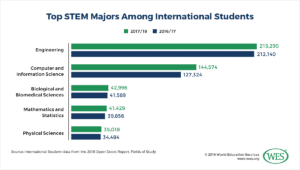Top 5: STEM Majors for International Students
Tuesday | March 19, 2019 | by Xiao Lu

According to the U.S. Bureau of Labor Statistics, there were 8.6 million STEM (science, technology, engineering, and math) jobs available in the United States as of 2015. With such a high demand for qualified employees, STEM students should feel confident in their prospects for employment after graduation.
As an international student in the United States, you might be wondering about the advantages of majoring in STEM. Plus, you might also be wondering which field of study would be best for you.
To provide you with more specific insights, WES Advisor looked at data from the Institute of International Education’s Open Doors Report.
Below, learn more about the most popular STEM majors for international students:
Top 5 STEM Majors
Per the data above, these are the five most popular STEM majors for international students in the United States:
- Engineering: The number of international students choosing engineering as their major—215,290—made engineering the most popular STEM major in both 2017 and 2018. This number represents 19.6 percent of all international students in the U.S. in 2018. Additionally, this figure reveals a growth trend: 1.5 percent more students majored in engineering in 2018 than in 2017. But engineering is a broad field, and you will have to choose a more specific major; understandably, you might want to choose your focus based on the highest demand for employment. According to a 2019 report from NewEngineer.com, the most in-demand engineering jobs fall into the categories of data science and machine learning (a branch of software engineering). Those popular fields are followed closely by robotics engineers and petroleum engineers.
- Computer Science: Ranked a close second to engineering, according to Open Doors, is computer and information science (which is often referred to as CS). In 2018, 144,574 international students selected CS as their major—a 13.5 percent increase from the previous year. The popularity of computer science corresponds with the U.S.’s high-growth information technology field—but IT is only one of several career options for those with a degree in CS. In 2017, computer programmers enjoyed a median annual wage of $82,240, according to the U.S. Bureau of Labor Statistics.
- Other Top STEM Majors: Coming third on the list is biological and biomedical sciences, with a total of 41,589 international students enrolled as of 2018; however, it ranks a distant third behind your first two options. This field of study is followed closely in popularity by mathematics and statistics (41,429 international students) and physical sciences (34,484 international students).
Watch the Webinar
STEM Programs for Business Majors
You might have also heard about business degree programs that require a lot of STEM classes. In these cases, it is possible for your business degree program to qualify as a STEM major. If so, your degree might be even more valuable when it comes to future job prospects and higher education opportunities.
If your business degree program requires a significant number of STEM-related courses—such as math, statistics, or IT—then there is a good chance that it can be designated a STEM major. For example, an information system program made up mainly of courses in data analytics, computer science, or engineering can be considered a STEM program—even if it is offered at a business school.
The U.S. Immigration and Customs Enforcement Agency have published a list of STEM-Designated Degree Programs. You can check to see if your program is eligible, or check with your school’s admissions office.
Learn More: Read the E-Guide
OPT Extensions for STEM Majors
In addition to a positive career outlook, there is another benefit that might encourage you to enroll in a STEM major in the United States: an extension of your Optional Practical Training (OPT).
International students pursuing a STEM degree in the U.S. qualify for a 17-month extension after their 12-month OPT expires.
In other words, STEM students can receive up to 29 months total of OPT. You can use this time to work or intern in the U.S. after completing your degree.
Final Thoughts
International students pursuing a STEM major are likely to encounter a prosperous job market in the U.S.
Although STEM careers require a lot of preparation and commitment, it might be worth the hard work. That’s because you can expect a positive outlook for STEM careers in the United States—both now and in the foreseeable future.
Related Reading

